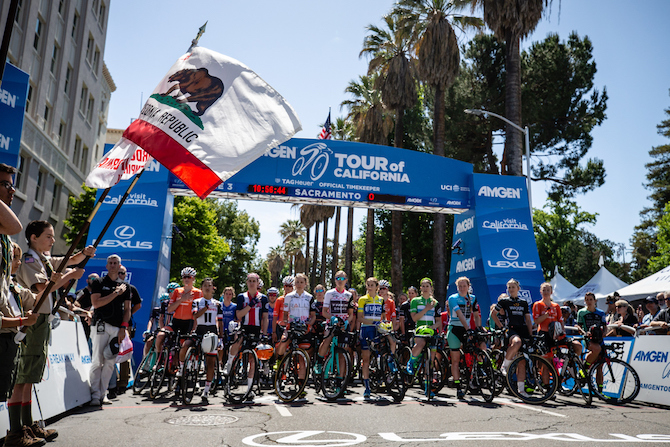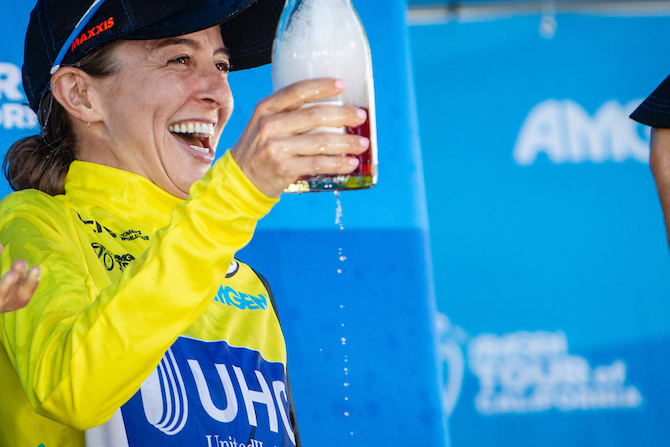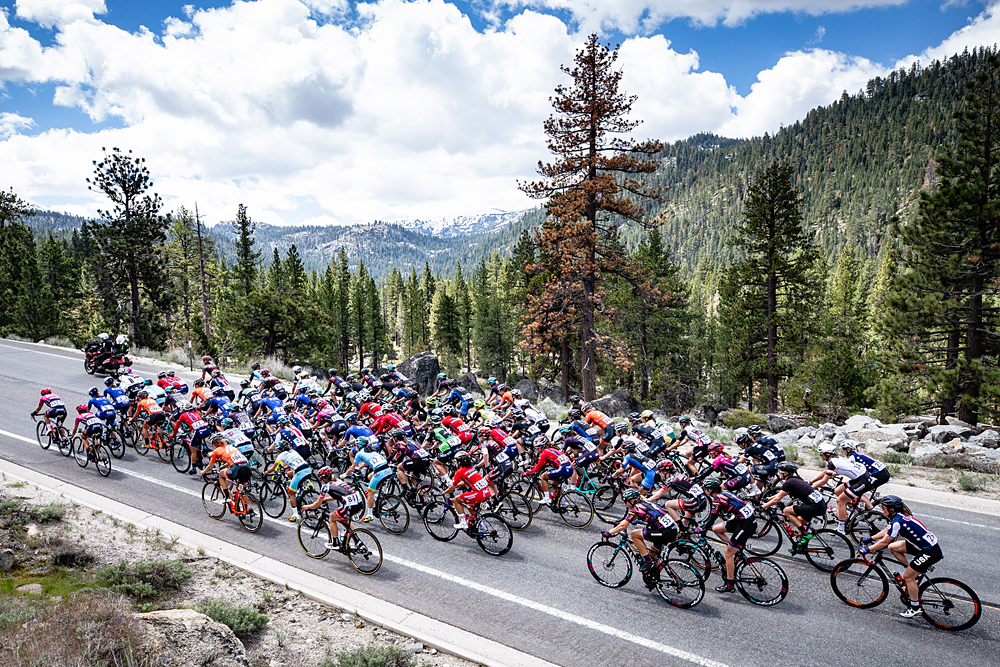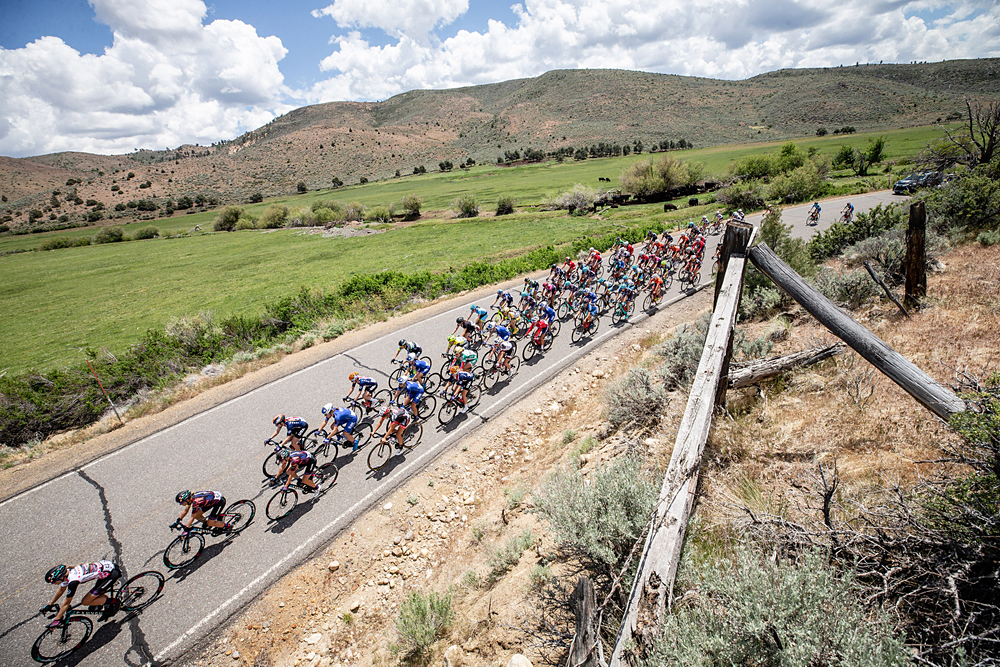Push to change roadway permits could force equality at Tour of California
Bertine, CEWS' Brennan advocate for amendments to AB 467 and Caltrans roadway permits




Amgen Tour of California organisers AEG could be forced to offer equal race days between its men's WorldTour and Women’s WorldTour events after advocates submitted letters to amend California State Bill 467, and to the California Department of Transportation [Caltrans], demanding equal use of California state roadways when running sporting events.
The Tour of California men’s race begins on Sunday with a seven-day race from May 12-18, while the women’s three-day race will be held from May 16-18.
Kathryn Bertine has teamed up with the Committee for Equity in Women’s Surfing (CEWS) co-founder Sabrina Brennan to attempt to amend/close the loopholes in California Assembly Bill 467, which focuses on paying women and men equally in competitions on California state land. But the bill still allows the exclusion of women from competitions on state roadways and state land and is silent on equal racing days.
In the meantime, Brennan, who is also the founder of Sport Equity, has sent a letter to the Director of Caltrans asking the state agency to update its permit requirements to reflect equal access to roadways.
Brennan and Bertine, who is the co-founder of Le Tour Entier and founder of the Homestretch Foundation, are advocating for additional amendments to AB 467 that include both equal pay and equal access for women in all races on state roadways. They wrote and support the amendments that require multi-day cycling events to include the same number of race days for women and men. Bertine submitted an "Oppose Unless Amended" letter requesting an amendment to the bill that was officially uploaded to California legislation last month.
"The reason that we suggested the amendment to this bill to include roadways, and not highways or streets because roadways are all-inclusive," Bertine told Cyclingnews. "For events like the Tour of California, or events in your local neighbourhood, the race director must go and get permits for the road, and that’s where it comes into play. Those permits, under bill 467, would not be issued unless their event is equal for men and women."
If the amendments to the bill pass, events like the Tour of California, which offer the only WorldTour and Women’s WorldTour events in the US, would be forced to provide equal race days for both events. It would not affect a race like the Redlands Bicycle Classic because organisers already offer the same race days for both men’s and women’s categories.
"Bill 467 makes sure that, in the state of California, women will have equal pay at competitions that are held on California state land, which also includes oceanfront, which is why the women in professional surfing have initiated this; to make sure that they have equal access to equal pay. That’s fantastic, and I was introduced to these women with the connection; 'how can this also serve other sports?’ Bertine told Cyclingnews.
Get The Leadout Newsletter
The latest race content, interviews, features, reviews and expert buying guides, direct to your inbox!
"Mainly cycling, because this is not a problem in running or triathlon where men and women have equal access to the same event. Coming up as a cyclist and knowing that we have discrepancy at the most renowned pro cycling event in the United States; the Tour of California is our Tour de France and the fact that women are still only racing for three days and the men seven days, that doesn’t make any sense."
Last year, organisers of the Tour of California announced that they would offer equal prize money to the men’s and women’s fields, which was a welcomed step among the women’s peloton. Bertine argued, however, that the payouts were not equal if the women were only paid for racing three days instead of seven.
Bertine noted that prize money isn’t the only issue when it comes to equality within the sport, but having the same number of race days is just as important. "If this bill also includes roadways, along with prize money, and can be applied so that all competitions will have equal access, that takes things a step further for us," Bertine told Cyclingnews.
"The major issue with the Tour of California is that it does not offer equal days of racing for men and women, and this is a WorldTour event. It’s just another indication that ASO and UCI are not valuing women as equals if they still have events where the women’s field is treated unequally, and that it is assumed that women can only do half of the races that the men can."
While the bill could force race organisers of events in California to provide equal race days to men and women, it would likely not affect the distances offered to men and women during each stage. The UCI sets the maximum distances for stage races and one-day races as part of its rulebook. For Women’s WorldTour stage races, the maximum average daily distances for stages are 140km, maximum distance per stage in 160km and the maximum distance for a time trial is 40km.
The co-authors of Bill 467 are Assemblymember Tasha Boerner Horvath and Lorena Gonzalez, but according to Brennan, anyone can advocate amending a bill at any time. Once the advocacy and letters for the amendment to a bill are set in motion, however, there are multiple steps involved before any concrete changes [if any] can happen. For example, but not limited to, the bill would move to the Senate Committee, where there is any number of committees that could review the amendments. If successful, it would then move to the Senate floor, and then the governor would need to provide a signature for the amendments to take effect.
"Right now, the bill amendment does not include Caltrans, which is imperative that it not just be a bill that changes California government code for State Parks, Coastal Commission or State Lands Commission, which is currently the case. It also needs to change the code for the department of transportation or Caltrans," Brennan told Cyclingnews.
"It needs to be expanded to include state roadways. Cycling would be completely left out because they don’t address the code that would change the requirements for the department of transportation or Caltrans.
"We also need to get the athletes to care about this, because if the athletes don’t care, then it’s hard to get anyone else to care. The cyclists should be up in arms over the fact that they have been left out of this bill."
Caltrans permits - a quicker solution
While the amendments to the bill are being considered, Brennan has come up with a short-term solution by contacting Caltrans directly to request it rewrite its permits for event organisers looking to host sporting events on California State roadways. Brennan also suggested that they could pressure Caltrans under the Unruh Civil Rights Act to update its permits.
"Changing the bill is not an easy process, and it’s hard to keep track of if you’re not a lobbyist," Brennan told Cyclingnews. "The bill is still important, and we will keep working on it, but you don’t really need the bill if Caltrans updates its permits for roadways to include equal race days."
The Unruh Civil Rights Act is a piece of California legislation that specifically outlaws discrimination based on sex, race, colour, religion, ancestry, national origin, age, disability, medical condition, genetic information, marital status, or sexual orientation.
Brennan has experience in this area, having in 2015 asked the California Coastal Commission to require a women’s heat as a condition of a Coastal Development Permit for the Mavericks Surf Competition. In a 7-4 vote to approve, Commissioner Mark Vargas added a condition to the permit requiring a plan for encouraging equal opportunity for women at future events, according to the CEWS website.
"We got the state agencies to require the changes in permits and leasing process. That same logic can be applied to department of transportation or Caltrans," Brennan said. "This is not a stretch at all because I’ve already made it happen in surfing. All we have to do is convince Caltrans that they are in violation of the Unruh Civil Rights Act. We have to show them that the Coastal Commission is already doing it, State Lands [CA State Lands Commission] is already doing it, and that they are discriminating against women athletes.
"I realise that it’s already too late for this year because the permits have already been issued, but it needs to be corrected for next year."
Brennan has already written a letter to the Director of Caltrans requesting the permits be rewritten to force event organisers into providing equal race days for men and women.
"We urge Caltrans to prohibit gender discrimination on state roadways," the letter stated. "Please comply with the Unruh Civil Rights Act and change the Caltrans permit process requiring the identical number of days for the women’s race and the men’s race.
Tour of California
Cyclingnews reached out to the organisers of the Amgen Tour of California, but they were not aware of the potential permitting changes, and therefore could not respond before the publishing of this article.
Tour of California held its inaugural edition of the men’s stage race in 2006 and the first edition of a women’s one-day event in 2008. That year, the Amaury Sport Organisation [ASO] and Anschutz Entertainment Group [AEG], owners, respectively, of the Tour de France and the Tour of California, formed a multi-dimensional marketing partnership to grow and develop each other's events, a partnership that is currently still in place.
While the men’s race has always been a week-long event, the women’s race started as a one-day criterium before adding a separate invitational time trial. It became a three-day stage-race in 2015, but organisers added a stage to make it a four-day for the 2016 and 2017 editions only to drop it back down to three days last year. Both events joined the WorldTour ranks in 2016.
As for race-day amenities for the athletes, the Tour of California Women’s Race ranks among the top events in the world. Cyclingnews understands that the teams stay in the same [or same category] of hotels as the men’s teams, with the same budget provided for meals. Organisers offer team presentations, post-race press conferences, and utilise the same finish line as the men’s stages. As noted above, they began offering equal prize money last year and did away with the dated tradition of using podium hostesses.
Cyclingnews also understands that the race has no television contract and relies solely on sponsorship, merchandise sales and VIP sales. Some of the event’s sponsors support both races, and some prioritize one race over the other, which often relates to the overall budget of each event.
Bertine believes that’s not good enough and that title sponsors such as Amgen should be aware of what they are and are not funding. "Shame on you, Amgen," Bertine told Cyclingnews. "Are you even aware as a sponsor that the women want a full seven days and that they are capable of racing a full seven days? Or are the race directors not even pitching that to you? It’s the race directors’ job when they’re searching for sponsors, to start with equality.
"Amgen should be ashamed that they are perpetrators of inequality because they don’t offer the same race days. I hope that this will embarrass them enough to finally get their heads out of the sand and offer a women’s seven-day event."

Kirsten Frattini is the Deputy Editor of Cyclingnews, overseeing the global racing content plan.
Kirsten has a background in Kinesiology and Health Science. She has been involved in cycling from the community and grassroots level to professional cycling's biggest races, reporting on the WorldTour, Spring Classics, Tours de France, World Championships and Olympic Games.
She began her sports journalism career with Cyclingnews as a North American Correspondent in 2006. In 2018, Kirsten became Women's Editor – overseeing the content strategy, race coverage and growth of women's professional cycling – before becoming Deputy Editor in 2023.